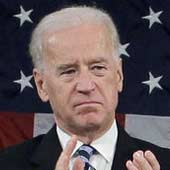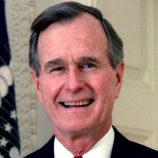The first
thing we should to note is the near silence by the corporate media to the comment.
When President George H.W. Bush, speaking of the situation in the Persian Gulf,
said "Out of these troubled times, our fifth objective -- a new world order
-- can emerge...", the media
pounced on it. Political talk shows were all over his remarks about a "new
world order" and its projected meaning, and yet with Biden, the media's
response is rather low key. Why is that, besides the obvious fact that Bush was
a Republican and Biden is a Democrat?
President Bush's comment, made
in 1991, was in regards to the growing situation with Iraq's invasion of the
Kuwait (or more specifically, the takeover of Kuwaiti oil fields which impacted
key oil companies with which Bush had close connections as a Texas oilman). He
was speaking about an American led coalition of nations acting in unison in
removing Iraqi President from Kuwait; the United States as the world's chief
police officer and arbiter of all things sacred
just.
In this case with Biden, he was
addressing some of the most powerful individuals in America, the presidents and
CEO of the nation's largest corporations such as Ford, General Motors,
Facebook, Amazon, Exxon, Twitter, and Alphabet, about the current situation in the Ukraine.
He also went on to say that the
world has reached a "inflection point" (which is a major change in
direction) which only occurs every three or four generations. He added that it
was up to the U.S. to determine the outcome of this global change and then lead
it.
Unlike Bush's speech, in which the U.S. and its allies at the time had jointly used sanctions backed up with military operations, Biden was addressing the use of sanctions and the potential of NATO to contain Russia, which is, in itself, questionable given Europe's dependence on Russian oil and gas.
If, going on Biden's comment, we
look back roughly three or so generations back to what he says was the last
great inflection point in humanity's history, we're looking at World War II. That
war, which was in truth a continuation of the first world war, marked the rise
and fall of Nazi Germany and Fascism, the Holocaust, the creation of Israel and
expulsion of Palestinians, the
beginnings of the Cold War, and with it, the change of the world's economy.
Following the end of World War
II, America's global role did change. It became the dominate world economy. It
also became, albeit briefly, the world's sole "superpower". It helped lead the way to the creation of the
United Nations in June 1945, just two months after VE Day and two months before
VJ in the Pacific. It orchestrated the creation of NATO in 1955 as the Cold War
between the three Western Allies and Soviet Russia begun (the Warsaw Pact, was
formed in 1955 as a response to NATO).
But perhaps more important, this "inflection point" created a
new economic order out of the ashes of war which called for global trade on a
previously unheard of level, a breakup of trade restrictions, the creation of
global reserve currency---the U.S. dollar, and the eventual end of the gold
standard. The post WWII period was seen as the "Golden Age of Capitalism".
However, all that glitters isn't
necessarily golden. The economic colonialism it created led to the rise of OPEC
and the use of oil and gas as an economic weapon (resulting in the oil and gas crisis of
1973/74) along with the stock market crash and subsequent recession of 1973
through 1975 (the joke at the time was "if it's a recession in Washington
DC then it's a depression in the rest of America").
We also saw America first exert its attempt to be the world's policeman; enforcing what it saw as right and wrong, which included overthrowing of legitimately elected governments (almost always "socialist") and the installation of brutal right wing militaristic juntas. Many times it also included the assassination or imprisonment of leaders and political opponents. But, as long as they were "business friendly", that was all that mattered. So, what was President Biden implying with his comment?
If Biden was implying that
because of the recent quagmire Russia has found itself in or that somehow
Russia will emerge as a weaker and less effective economically or militarily,
he needs to reconsider his opinion. There's no question that Putin's invasion
of the Ukraine was ill-conceived, even though his reasoning---to avoid
encirclement---was understandable.
Russia has incurred the wrath of
the world. It is facing historic economic sanctions, but sanctions alone aren't
going to be effective. Russia has developed some strong trade relationships
with other countries; particularly China, which now finds itself in a unique
position. Both countries have a long history of being "frenemies",
not altogether too different than the one it has with the United States. If forced to choose between the West and
Russia, China's economic interests lays to the West and Russia knows it.
Militarily, the Ukraine hasn't
proven to be the "marshmallow" Putin's military advisers envisioned
it to be. We can see Putin's growing
frustration and impatience through the increase in his use of more and more destructive
weapons like hypersonic missiles or "vacuum
bombs". We've also witnessed his
advances breaking down thanks to stiff resistance of Kiev's military and the
tenacity of its citizens.
This is, in quick order I suspect, going to put Putin at his own "inflection point" of either facing a protracted war similar to the one Russia fought in Afghanistan; escalating the war to a nuclear or biological level which would earn more than mere condemnation or sanctions and a likely reprisal by NATO and the U.S., or concluding a peace which excludes a NATO presence in the Ukraine and annexation of the Donbass.
We would also be amiss not to
mention President Biden's call for Putin to be charged as a "war
criminal" and held accountable by the Hague for war crimes. As an aside,
the Nuremberg Trials following WWII, was the first time a country's leaders
were ever had personally responsible for the policies and orders given during
the conflict.
Since then, few leaders have been arrested or voluntarily
turned themselves in to faced a trial. It's highly unlikely that Putin will be
subject to either. First of all, it's very difficult to determine what a
political leader ordered and how their subordinates interrupted those orders,
especially under wartime conditions.
If the extermination camps had
not been discovered, and (to be brutally honest), had the Jews living in U.S.,
the UK, and elsewhere, hadn't had the clout they did, it's unlikely that any of
the Nazi leaders would have put on trial, let alone executed. Don't believe
me? Consider the Roma gypsies.
More Roma were murder (based on
percentage of population) than Jews or any of the other groups in Nazi camps,
and yet what compensation or recognition have they received? Did these homeless
people receive land for a country? How many museums or monuments exist for
them?
As an aside, there's no question that Japanese, Hungarian, Romanian, and Italian war leaders were just as guilty as were some of Nazis, and yet virtually none were executed in the numbers that the Nazis were, nor the fact that the Allies were guilty of war crimes too, though not to the same extent.
Lastly, let's consider the
notion of a "new world order" itself. The concept was intended to the
creation of a more integrated world, ranging from stabilized trade, global
justice, and manufacturing to issues like poverty, disease control, education,
and environmental issues. Some would include the spread of democracy.
In truth, the "new world
order" is nothing more than an illusion. It requires a central authority
that requires the suppression of national sovereignty. It assumes that the
nations are lining up to become "democratic", when in truth democracy
isn't for everyone, least of all American style democracy.
Did you know that of all the
world's democracies, none---not one---has modeled itself on the United States?
Instead, they've chosen the British parliamentarian style principally because
it doesn't rig the system with two "winner take all" corporate owned
parties, but allows everyone to have a voice with multiparty representation.
For that matter, America isn't a
democratic as it thinks it is. In fact, it's ranked #25 according to the
Heritage Foundation, putting it in the lower half of the "Mostly
Free" section. In addition, America
is listed as a "flawed democracy", which is one step above a failed
democracy.
Officially the U.S. is still called a Republic, but is in fact a Corporatocracy, which is a sort of neo-fascist merger between government and big business. So, who is the "freest country in the world? Singapore, followed by Switzerland and Ireland. Surprised?
America has also forfeited its
role as the world's policeman and arbiter of what it defines as "good"
or "moral". The world doesn't want to become mirror images of the
U.S.. Perhaps this type of leadership was needed following the chaos of WWII
where a certain guidance was needed, but no more. Nations don't want a
"big brother". They want fair trade and to be treated as equals. They
want to develop and embrace their own culture, traditions, and values, and with
it, their own economies without being dominated or manipulated by imperialistic
corporations.
So, where does the leave
President Biden and his "new world order"? Well, other than stroking
the egos of a few dozen powerbrokers who together own both political parties,
not much. American hegemony is on the decline. Using the threat of economic or
military muscle to force of open markets or gain access to resources will not
be effected going forward.
Capitalism must constantly
consume and innovate to survive or else it dies. In addition, it faces a
growing competition from China. Therefore, it must find ways to create
equitable and long lasting partnerships to succeed such as investing in its
partner's education, job training, and infrastructure. Relationships can no
longer be disposable or one sided.
At the same time, America must
encourage other nations to become their own regional policemen and assume
responsibility for their own security. America can no longer afford to pick up
the tab. It needs to invest in its own education, technology, and
infrastructure in order to remain competitive.
If there is a "new world
order", it will have to be one of
regionalization coupled with fair trade. There is a time for expansion and then
there is a time for internalization. Now is the time for the later.
If you want to know more, please take a look at the links below. If you enjoyed the article, please consider passing along to others and don't forget to subscribe. It's free! Lastly please be sure to "like" us on whatever platform you use to read A/O. It helps with the algorithms and keeps our articles in circulation.
Biden says U.S. must lead 'new
world order'
Bush 'Out Of These Troubled
Times...A New World Order'
Lists of wars from 1946 to 1989
2022 Index of Economic Freedom






No comments:
Post a Comment